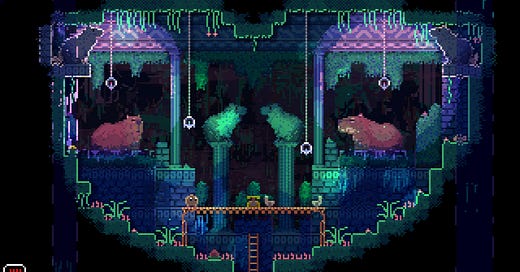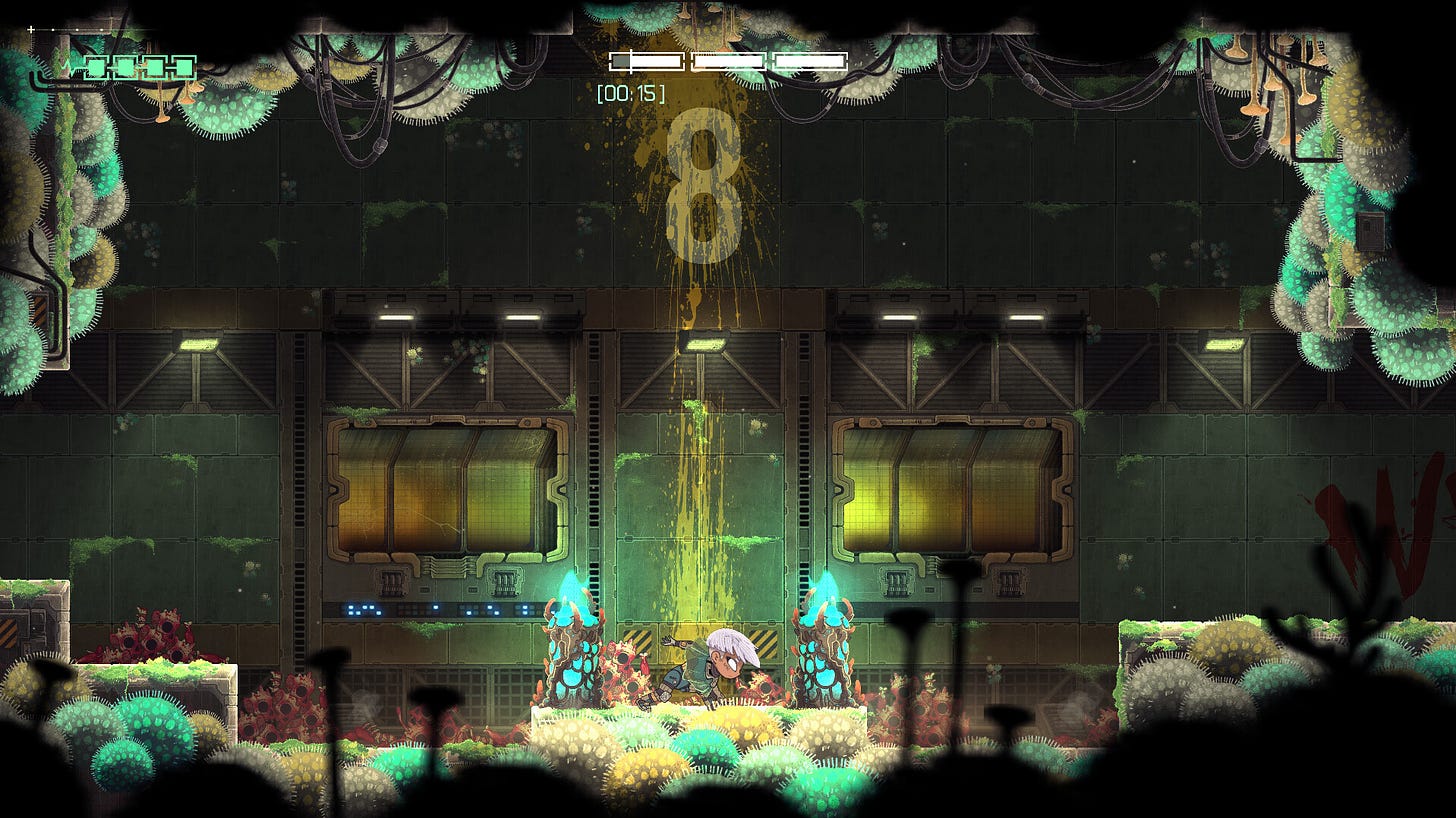
Indie developer has a plan to keep parts of his game secret, even from data-miners
Plus: Why another game creator is daring to make his game solvable in four minutes.
Billy Basso, developer of the labyrinthine upcoming video game Animal Well, loves when games have secrets. And he knows how hard it is to keep them hidden these days.
“At any point when you're playing the game I want there always to be something that you're wondering about, curious about,” he told me as I was playing Animal Well at a recent Nintendo-hosted indie showcase in San Francisco
(The game, in development for seven years, is set to release on Switch, PlayStation and PC on May 9.)
“Even as you uncover secrets, I want there always to be another layer that’s teasing you.”
Such a plan is hard to maintain in modern gaming, where even the most deeply buried secrets can be found not just by people as they play the game, but by data miners who drill into the game’s code and unearth them.
Data miners can find cut content in Elden Ring’s code or hints of characters that won’t be added to Call of Duty for months. They’ll spot easter eggs like coupons for spicy ramen, suspicious virtual t-shirts and a slew of unannounced Pokémon.
And game makers will often just throw up their hands.
Last year, when a game developer went on Reddit to ask peers how to hide content from all players in the modern age of data mining, another game maker said it was hopeless and that they just needed to take it as a positive that players might try to find them. “You can encrypt files and packages and bury things in obfuscation but if someone really wants to find something, it's something of a futile arms race to try to stop them,” they wrote.
Basso is pushing back.
“There's kind of a defeatist attitude generally among game developers in the community that people will data mine things,” he said. “The collective power of the internet's so powerful that people have figured out things within days, so most developers don't even try it.”
He’s certainly not giving up trying to hide his game’s deepest layers.
When Animal Well launches, there will be optional, playable parts of the game that will be encrypted in the code, but with a twist: the key to unlock them will not also be buried in the code.
“You have to sort of input it through playing the game, to the credits and some later sections,” he said.
With luck, that means no one will crack it until someone plays to the point of figuring it all out.
There are decades of interviews with game developers who are proven to be overconfident that the secrets of their games won’t be cracked. Many have misjudged the expected rarity of things players wind up figuring out on launch day.
Basso is at least confident that data miners can’t brute force their way to discovering his encrypted secrets. He’s using industry-standard AES encryption. ”It's pretty secure, unless we get quantum computers or there's some giant vulnerability,” he said.
Basso also knows that encrypting content alone is rarely enough to stymie data miners. The good ones can find the keys if they’re also in the code, which is why he won’t put the key in there and will instead make it discoverable only by playing the game.
As Basso shared his plan with me, I was controlling a small circular critter who could hop through Animal Well’s strange 2D world full of plants, caves, creatures and ladders. I’d managed to find a hidden passageway and a strange candle, though I was briefly stumped on how to light it.
Those were some of the game's most surface-level secrets. Basso was talking about much deeper layers of mystery.
“I just remember this time when I was younger, when games felt magical and unknowable,” he said. “And, I just want to recreate that experience for a modern audience.”
Item 2: ‘It’s wild that I want that’
There is a chance that someone who gets a copy of the video game Echo Weaver, once it comes out in a year or two, will quickly finish it.
“As a designer, this idea just fascinates me that someone could Google our game, read all the secrets, buy it, boot it up and beat the game in four minutes,” mused game designer Chris Sumsky, when we chatted at an Xbox-hosted indie showcase last month in San Francisco.
“It’s wild that I want that. But it is truly the design pillar behind the game.”
Sumsky and his small team at indie studio Moonlight Kids are making Echo Weaver, a 2D action-exploration “metroidvania” game (aka the kind of game in which players explore caverns or castles, discover new abilities and then backtrack to use those abilities to proceed through previously impassable areas).
Echo Weaver’s standard run-time is expected to last much longer than four minutes.
It’ll run many hours, in fact, across multiple time loops as players explore and re-explore a mysterious sci-fi world.
But the game will borrow perhaps the boldest concept from 2019’s acclaimed Outer Wilds, which Sumsky considers ”one of the greatest games ever made.”
In that time-looping adventure, players had 22 minutes to explore a collapsing planetary system before its star went nova. Events in its galaxy—the explosion of a space station, the crumbling of a planet’s shell, the immersion of a temple under a sandstorm—repeatedly played out across a set timeline. Racing the clock, players could learn new abilities, discover secret codes and apply new techniques, the better to survive those 22 minutes and approach the game’s true ending.
Outer Wilds’ bold concept was that everything the player attained was knowledge and that, if players simply knew it all in advance, they’d be able to clear the game on their first run. This wasn’t a game that gated progress behind items players needed to collect across its adventure. If players knew the solutions, they could execute them immediately.
That idea has intoxicated Sumsky, who framed Echo Weaver as a Metroidvania that is also entirely knowledge-based.
“I love platformers. I love Metroidvanias. I've always wanted to make one,” Sumsky said. “But they're a dime a dozen. And I was like, ‘Man, no one's really taken the time-loopy Outer Wildsy way of rolling out a game and merged it with movement, speedrunning influences, mastery of platforming, which to me seems like a natural fit. I know this [non-player character] will be here blowing up half the station at the three minute mark. How do I get there in time? Learn your routing… combine it with shortcuts, all kinds of crazy secrets.”
This kind of design inherently allows some players to accidentally discover some of the game’s secret knowledge early, as happened with many Outer Wilds players who stumbled on shortcuts or held a button long enough to discover a secret power before the game taught it to them.
Echo Weaver’s developers need to make sure that accidental discoveries aren’t too common. “I think I threshold for acceptance is like 10-15% of people stumble on it early,” Sumsky said. “That's okay. And honestly kind of cool.”
Echo Weaver’s biggest challenge is likely to be just standing out. Metroidvanias are common now, and even the people who make the actual Metroid games have found that, as acclaimed as the best in the genre are, they’re a relatively hard sell.
“I think we're finding that to be true just in terms of publisher-hunting and funding-hunting,” Sumsky said. “We didn't really know that two years ago when we set out to make this.”
Echo Weaver is a slow-burn game at first. When I played it, I initially didn’t understand what made it special, only to get hooked once I started discovering secrets and looping back in time to apply that knowledge.
Sumsky hopes releasing a demo to the public in the latter half of the year can help generate support. He points to games such as Tunic that could be mistaken for another common entry in a crowded genre but quietly harbored some big, fundamental surprises. “You have to get your champions on your side: those people who have gotten to the crazy part and they're like, ‘Go, go, just, like, keep playing.”
And if that works, getting some four-minute speedrunners won’t be a drag at all.
Echo Weaver is targeting a 2025 or so release date, with a scalable design that Sumsky believes will allow Moonlight Kids to build and polish a game whose size matches whatever amount of funding they’re able to attract.
Item 3: In brief…
🤔 Jim Ryan, who officially ended his role as head of PlayStation at the end of March, shared the (hypothetical?) advice he’d give to his successor, per the Official PlayStation podcast: “I think for the next CEO of PlayStation, of Sony Interactive Entertainment, I’d say one simple thing: ‘Never forget that we deal in entertainment.’ That’s what’s made us successful in the past. And I think as long as we don’t lose sight of that, we will continue to enjoy success in the future.”
Ryan’s immediate successor is Sony’s overall chief financial officer, Hiroki Totoki, who recently told investors that he believes PlayStation’s game studios “don’t necessarily understand how their respective efforts tie into overall growth, sustainable profit generation, and higher margins.” Totoki is serving as PlayStation’s interim-CEO until a permanent one is found.
📊 “The New York Times is now a gaming company on the basis of customer time spent,” writes gaming expert Matthew Ball, citing a chart from ValueAct that shows the Times’ Games app matching its News app for global time spent.
😲 Saber Interactive has 40 projects in active development, including September’s Space Marine 3 and “a certain one that the press loves to write about” (presumably this one),” Saber CEO Matt Karch wrote on Linkedin in a message to “Saber Employees, Fans and Critics.”
Karch recently bought Saber and some 3500 workers out from The Embracer Group, which Karch praised: “As someone who served as a board member and as COO of the company during the first half of the restructure, I can say with confidence that no one has cared more for their people than Embracer and no one has served as a better role model for me with regards to how to treat his people and to operate a business in a responsible and ethical manner than [Embracer CEO] Lars Wingefors. In my mind, Embracer cares more about games and has done more positive things for this industry than any other company I have dealt with in the past decade. “
👨🏻⚖️ A lawsuit against Roblox can proceed on claims the company was negligent and violated California’s unfair competition law in failing to crack down on and potentially profiting from the operation of online casinos on Roblox, a judge ruled last week in the ongoing case of Colvin et al v. Roblox et al., per a review of the court order by Game File.
The allegation that Roblox violated a RICO statute, in effect participating in a gambling ring, was dismissed for lack of sufficient facts. Lawyers for the parents suing Roblox and the casino operators have two weeks to try again to sue over those claims.
Roblox’s community standards bar gambling on its platform and the company has denied any wrongdoing.












Glad to see Animal Well getting some press coverage. I'm excited to see Dunkey's first published video game!
Wow, even the actual Metroid games are having trouble with the sell? Super interesting. It seems like something across all arts/entertainment in recent times where there’s just so much stuff out there.